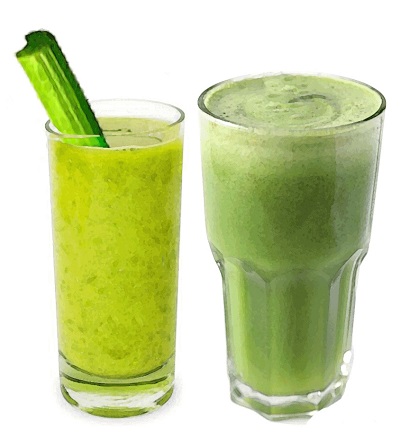Positive Health Online
Your Country

Juices V Smoothies
listed in nutrition, originally published in issue 223 - July 2015
Juicing and blending are very fashionable at the moment and I often get asked about the difference between juices and smoothies.
Here’s a quick guide

Juices
A juicer extracts the nutrients and water out of the vegetable or fruit and removes the pulp.
Pros
- Because the insoluble, bulky fibre has been removed with the pulp, juicing means a much higher volume of produce can be consumed at one time. Insoluble fibre slows down digestion and keeps you feeling satiated for longer meaning that less volume is consumed. It makes sense that the level of plant nutrients and antioxidants is going to be higher in juice and some research done by the Australian Government National Measurement Institute * has backed this up. A green juice and a smoothie were made using the same ingredients and compared for nutrient content. The results were that the juice contained significantly more beta carotene and vitamin C than the smoothie;
- Juices are easily assimilated by the body, which is important for people with a sensitive digestion / IBS. Plant fibre is not designed to be digested and absorbed in the human intestine. Whilst fibre is beneficial (see below), sensitive individuals can only tolerate small amounts.
Cons
- Juices contain more sugar, particularly fruit juices. Green vegetables will have a lower glycaemic index (GI) than for example, carrots, beetroot and sweet potato although the latter contain valuable carotenoids;
- There are more of substances called oxalates in juices. Kidney stones are commonly made of calcium oxalate;
- If you have a thyroid problem, high oxalate juices are not recommended.
Very high oxalate vegetables are beetroot, spinach, sweet potatoes and Swiss chard.
Avocado, cabbage, cucumber. Lettuce, endive, broccoli, cauliflower, radishes, coconut are low oxalate.
Smoothies
A smoothie contains the whole blended fruit or vegetable.
Pros
- Contains fibre which assists healthy bowels, balances the intestinal pH creating an environment for healthy bacteria, speeds up the removal of toxic waste from the colon and reduces cholesterol. Fibre also plays a role in controlling blood sugar levels, by extending the time it takes for the stomach to empty so that sugar is released and absorbed more slowly. This means insulin spikes are less likely. However, sugar release still happens slightly faster than if the whole fruit or vegetable is eaten because the produce has been broken down by the blender before consuming;
- Can blend seeds such as sesame, sunflower, pumpkin, chia and flax which supply protein and minerals;
- Preparation and washing up time are greatly reduced with a smoothie maker as opposed to a juicer. This is a very important consideration if you are time pressured.
Cons
- People with IBS / bowel issues often find the fibre aggravates bloating/gas;
- The new high powered blenders are great for a smooth as velvet consistency but some research suggests the nutrient levels are reduced due to oxidative damage by the blending action.
The solution
- Drink a range of both smoothies and juices and select as wide a variety of vegetables as possible from the full rainbow of colours; green, orange, red, blue, purples, yellow;
- If you have thyroid issues or kidney stones avoid the very high oxalate vegetables above;
- Avoid bought smoothies that contain concentrated fruit juice which hikes the sugar levels. When making your own, blend mostly vegetables rather than fruit;
- When blending, keep to 30-60 seconds to reduce oxidative damage and preserve more nutrients.
According to traditional Chinese medicine, raw fruit and vegetables are generally cooling. So if you feel the cold or, in the depths of winter, it’s best to balance your juices and smoothies with hot soups and add fresh ginger which is a warming spice.
References
*Adorno P. Breville Juicer / Blender Trials Australian Government National Measurement Institute 2013.
Comments:
-
No Article Comments available